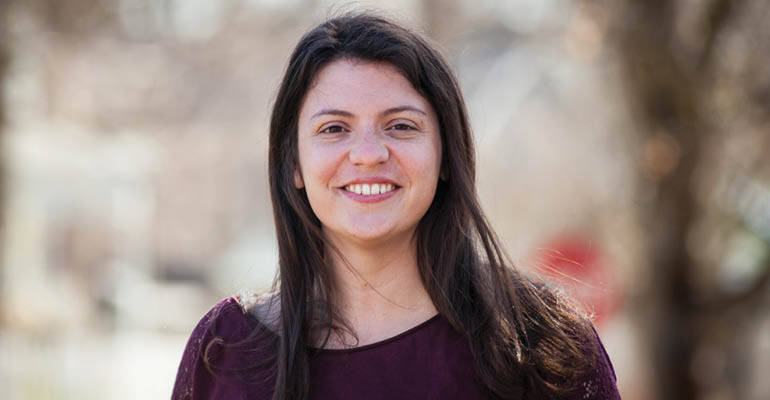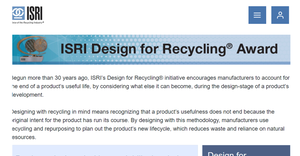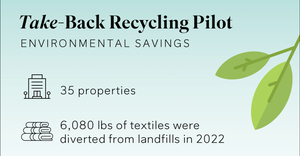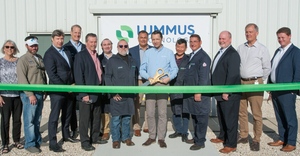We spoke with the Waste360 40 Under 40 award recipient about how she helped develop a new way of measuring recycling rates in the State of Michigan and her role in the industry collaborative Materials Recovery for the Future project.

Beth Coddington, a consultant at Resource Recycling Systems (RRS), has utilized her economics background to create a successful career for herself in the waste and recycling industry. Since joining RRS 10 years ago, Coddington has taken the lead on a number of recycling and recovery studies, found new recovery pathways for difficult-to-manage packaging materials and helped the Carton Council grow residential carton recycling access tremendously.
“Beth is detail-oriented and thoughtful and possesses a gift for distilling large amounts of data into meaningful information and communicating it in an accessible way. In addition to leading influential projects, she takes the time to teach and mentor junior peers and help them learn the industry,” says RRS Senior Consultant Catherine Goodall.
Waste360 recently spoke with the Waste360 40 Under 40 award recipient about how she helped develop a new way of measuring recycling rates in the State of Michigan and her role in the industry collaborative Materials Recovery for the Future project.
Waste360: How did you begin your waste and recycling career?
Beth Coddington: I have been working with Resource Recycling Systems for the past 10 years. When I first joined the company, it was a fairly small consulting company with about 10 people so I worked as a jack of all trades doing some administrative work, some work on recycling programs, some work on solid waste and some work in other areas of business.
Since then, the company has grown to more than 40 people in various locations, and my role has transformed from a jack of all trades to a specialized role in project management and consulting. My role now allows me to take advantage of some of the skills that I gained from my economics degree from Wesleyan University in Connecticut.
Waste360: Tell us about the “2015-16 Centralized Study on Availability of Recycling” that you helped conduct for the Sustainable Packaging Coalition.
Beth Coddington: The Sustainable Packaging Coalition has created the How2Recycle label, which can be applied to any consumer packaging product to help consumers better understand how to recycle products. As part of that program, the coalition was interested in getting some standard metrics around how many people have access to recycling for a range of materials so it reached out to us for help.
We decided to conduct a study of a large group of industry organizations that make different types of packaging to measure the availability of recycling for those different materials, such as plastic, paper and metal. For the study, we partnered with Moore Recycling and came up with a methodology that would work for all of our stakeholders.
We ended up putting out a great report based on public information provided to consumers that showcases the availability of recycling for about 49 different materials. The report also provides information on things like curbside recycling, drop-off recycling, dual stream recycling and single stream recycling in the U.S.
Waste360: Tell us about the Materials Recovery for the Future project and how you’re helping to find recovery options for hard-to-recycle materials.
Beth Coddington: This project is very future oriented, and it looks at where packaging is going and how recycling systems are able to cope with and keep ahead of those changes. For this project, we teamed with retailers, packagers, industry organizations and other industry leaders to test how flexible plastic packaging could be managed at materials recovery facilities with automated optical sorters. We are going to continue that research this year and really focus on optimizing optical sorters’ ability to separate flexible plastic packaging from other materials. We are also working to implement this program in a pilot community to gather more data.
The one thing I really love about this project is that various members of the industry are coming together in a proactive way to try and develop smart solutions for the future of packaging. I am excited to see where this project goes and what we can come up with.
Waste360: How did you help develop a new way of measuring recycling rates in the State of Michigan?
Beth Coddington: This study, which was completed a few years back as part of the governor’s recycling initiative, highlighted participation rates of the state’s recycling programs and how much material was being diverted, recycled and composted.
Michigan, unlike some parts of the country, doesn’t require recyclers to report how much material they recycle so we had to use voluntary data collection, a material flow model, interviews from recyclers and data collected by the state of to create the study.
I am really happy to say that Michigan now has recycling data collection requirements that were implemented as part of this study. Going forward, we will now have a better understanding of the state’s accurate recycling rate.
In addition to that, Ann Arbor is one of the cities in Michigan paving the way for the future of recycling in the state. It has created a unique curbside food waste collection program by piggybacking on its existing yard waste collection program and gradually rolling out the service to customers who are already utilizing carts for yard waste.
Waste360: How have you helped fuel the Carton Council’s growth in residential carton recycling access?
Beth Coddington: RRS started working with the Carton Council back in 2008, when it was exploring the idea of making cartons a mainstream recyclable commodity. At that time, only 18 percent of U.S. councils had carton recycling access, and now, more than 60 percent of U.S. councils have carton recycling access.
Carton recycling is something that’s not top of mind for most people, but that may change now that more and more packaging is being labeled with the recycling logo.
This partnership is an ongoing process that involves a lot of data collection and tracking the success and failures of campaigns. To keep the growth momentum, we are constantly looking at where we can add carton recycling programs and where we can fill in the gaps.
Waste360: What are some of the goals you are working toward this year?
Beth Coddington: RRS is growing nationally, and I recently just moved to Boulder, Colo. We have a new office that just opened up here, and I am excited to start working with clients who are located in the western half of the country.
Additionally, I am focused on targeting the materials that need to get recycled from both a volume perspective and a sustainable materials management perspective. I enjoy working with emerging and hard-to-recycle materials like flexible packaging and cartons and coming up with new ways to divert those materials from landfill. There are new products released daily so there is never a shortage of materials to find recycling solutions for.
Waste360: What advice do you have for someone who is interested in having a career in the industry?
Beth Coddington: I would encourage anyone who is looking to enter the industry to do it because this industry is both challenging and rewarding. It’s not a glamourous job by any means, but if you are smart and motivated you can make an impact on the industry. Also, don’t be afraid to be hands on, go behind the scenes and get your hands dirty because that’s how you will learn the most about the field.
About the Author(s)
You May Also Like




